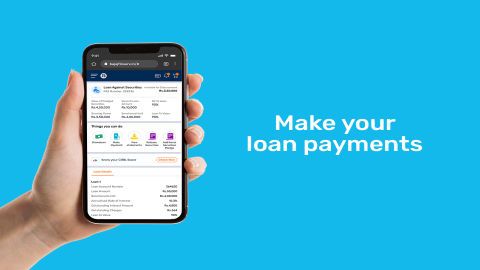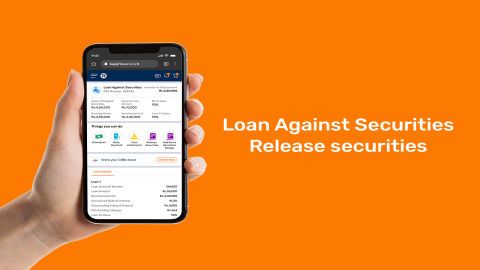Comparative analysis: Loan against fixed deposit vs unsecured loans
When in need of quick funds, both Loan Against Fixed Deposit (LAFD) and unsecured loans emerge as popular options. However, they differ fundamentally in terms of structure, cost, and eligibility. While a loan against fixed deposit is a secured loan where your FD acts as collateral, an unsecured loan does not require any asset backing, making it more accessible but typically more expensive.
Here’s a breakdown of how these two loan types compare across key parameters:
Feature
|
Loan Against Fixed Deposit (LAFD)
|
Unsecured loans
|
Collateral requirement
|
Requires you to pledge your fixed deposit as security
|
No collateral needed; loan is approved solely on creditworthiness
|
Interest rates
|
Lower, as the lender has security in the form of your FD
|
Higher, to compensate for the lender’s risk
|
Loan amount
|
Typically, up to 75% of your FD’s value
|
Depends on your income, credit history, and the lender’s internal criteria
|
Processing time
|
Faster processing since the collateral minimizes risk and reduces formalities
|
Slightly longer as it involves detailed verification and risk assessment
|
Repayment tenure
|
Usually short to medium-term, ranging from 12 to 36 months
|
Can range from a few months to several years depending on the lender
|
Eligibility criteria
|
Must have a valid fixed deposit with the lender
|
Based on your income level, credit score, and employment stability
|
Documentation required
|
Minimal—usually FD receipt, ID proof, and address proof
|
More documentation such as salary slips, bank statements, credit reports, etc.
|
Risk of default to lender
|
Low, since the FD can be liquidated if you default
|
High, as there is no backup asset
|
Common use cases
|
Ideal for emergencies or short-term liquidity without breaking the FD
|
Used for various purposes like weddings, travel, education, or medical needs
|
Impact on credit score
|
Minimal if paid on time; less reliance on credit score
|
Heavily dependent on repayment discipline; defaults can severely impact credit health
|
If you already have an FD, choosing alternatives to unsecured loans like a loan against FD can help you save significantly on interest. Apply now to get started
Eligibility criteria for loan against FD
A loan against fixed deposit is one of the simplest secured borrowing options as the FD itself acts as collateral. The eligibility requirements are minimal, making it easily accessible. Key criteria include:
Applicant must hold a valid fixed deposit with the lender.
The FD should not be in the name of a minor.
Joint FD holders must secure consent from all parties to apply for the loan.
The FD must have a minimum value as specified by the lender.
The tenure of the FD should be sufficient to cover the loan duration.
Eligibility criteria for unsecured loans
Unsecured loans are based on creditworthiness rather than collateral. Lenders assess your financial background to determine eligibility. Common criteria include:
Applicant must be an Indian resident within the specified age bracket (usually 21–60 years).
Stable source of income, either salaried or self-employed.
Good credit score and repayment history.
Minimum monthly or annual income requirement as per lender’s policy.
Fewer existing liabilities to ensure repayment capacity.
Step-by-step process to apply for loan against FD
Applying for a loan against FD is simple, as most lenders offer both offline and digital application options. Steps to follow:
Check if your FD qualifies for a loan with the lender.
Visit the lender’s branch or online portal.
Fill out the loan application form.
Submit FD details and identification documents.
The lender will assess eligibility and approve instantly.
Loan amount is disbursed to your account, while the FD remains as security.
Step-by-step process to apply for unsecured loan
Since unsecured loans do not require collateral, the process is straightforward but may involve stricter verification. Steps to follow:
Assess your loan requirement and check eligibility criteria.
Visit the lender’s website or nearest branch to initiate the application.
Complete the loan application form with personal and financial details.
Submit mandatory KYC, income proof, and bank statements.
Lender reviews credit history, repayment capacity, and documentation.
On approval, the loan amount is directly transferred to your bank account.
When to prefer loan against FD and when to opt for unsecured loans?
Both options cater to different financial needs. The right choice depends on your existing assets and urgency of funds.
Loan against FD is ideal when:
You want lower interest rates compared to unsecured loans.
You have an FD and do not want to break it prematurely.
You need quick approval with minimal eligibility checks.
Unsecured loan is preferable when:
You do not have an FD or other collateral.
You require higher loan amounts beyond FD limits.
You have a strong credit profile and can handle slightly higher interest rates.
Pros and cons: Loan against FD vs unsecured loans
Choosing between a loan against fixed deposit (FD) and an unsecured loan depends on how quickly you need funds, your cost sensitivity, and whether you’re comfortable pledging an asset. Here is a clear, side-by-side breakdown to help you decide.
Loan against FD
Pros
- Lower interest rates: Since the FD acts as collateral, lenders usually offer rates lower than unsecured loans.
- Quick approval and disbursal: Minimal checks make the process faster, often with same-day access to funds.
- FD continues to earn interest: Your deposit keeps growing while you use the loan amount.
- Flexible repayment: Options like interest-only payments or easy foreclosure are commonly available.
- Limited credit impact: Easier eligibility, even with an average credit score.
Cons
- FD gets lien-marked: You can’t withdraw or break the FD until the loan is repaid.
- Loan amount is capped: Typically limited to a percentage of the FD value.
- Risk to savings: Non-repayment can lead to adjustment against the FD.
Unsecured loans
Pros
- No collateral required: You don’t need to pledge savings or assets.
- Higher loan eligibility: Amounts may be higher if income and credit profile are strong.
- Freedom over assets: Your investments and deposits remain untouched.
- Clear repayment structure: Fixed EMIs make budgeting predictable.
Cons
- Higher interest rates: Increased risk for lenders means higher borrowing costs.
- Stricter eligibility: Strong credit score and income proof are essential.
- Longer processing time: More documentation and checks can delay disbursal.
- Heavier EMI burden: Higher rates translate to higher monthly outgo.
Conclusion
Both a loan against fixed deposit and unsecured loans serve different needs. If you have an FD and are looking for affordable, quick funds, a loan against FD is often the smarter choice. It lets you unlock liquidity without touching your savings. Unsecured loans work well when you do not have assets, but they come at a higher cost.
Before choosing expensive unsecured loans, always explore alternatives to unsecured loans like a loan against fixed deposit. It could be the easier and more economical option for you. Apply now






